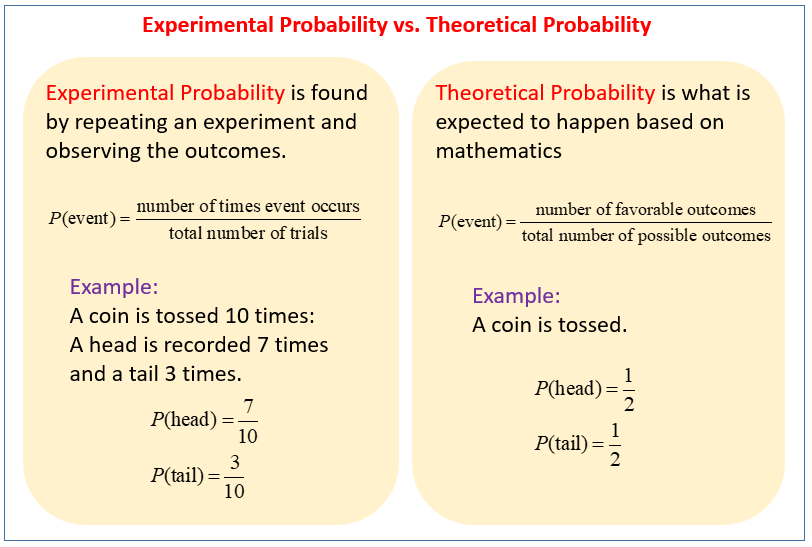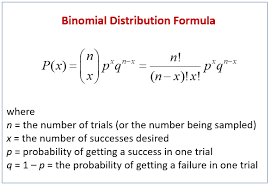Theoretical probability
Table of Contents
Table of Contents
Do you wonder about the chances of a certain event taking place? Curious about how likely it is to rain tomorrow or to roll a six on a dice? Empirical vs Theoretical Probability is a topic that might help answer your questions. Probability is the branch of mathematics that deals with the study of random events. It is a fascinating and complex field that holds significant importance in many areas of our lives, from gambling to sports to computer science.
Pain Points Related to Empirical Vs Theoretical Probability
Empirical vs theoretical probability can be confusing for some people. It is not always easy to understand what the difference between them is, why we need to know about them, or how they relate to each other. It can also be challenging to determine which type of probability to use when making predictions or analyzing data. Furthermore, some people struggle with calculating probabilities or with interpreting the results of a probability experiment.
Answering the Target of Empirical Vs Theoretical Probability
In probability, we use the term ’event’ to refer to a specific outcome or set of outcomes. Probability is then the measure of the likelihood of this event happening, ranging from 0 (impossible) to 1 (certain). Empirical Probability refers to the probability that an event will occur based on experiment or observation. It involves conducting an experiment and collecting data to calculate probabilities based on past outcomes. In contrast, Theoretical Probability is calculated by analyzing the underlying principles of an event instead of collecting data from experiments.
Summary of the main points related to Empirical Vs Theoretical Probability
The fundamental difference between Empirical and Theoretical Probability is how they are calculated. Empirical Probability uses real-world observations and data to calculate probabilities while Theoretical Probability uses theoretical models and principles to make such calculations. Empirical Probability is often used in areas like science, business, and social sciences while Theoretical Probability is useful in solving complex theoretical problems.
Empirical Vs Theoretical Probability Explained
When I was in school, one of my favorite subjects was mathematics. I remember being amazed at how probability could help in predicting future events or estimating the likelihood of a particular outcome. As I grew older, I realized that probability is not just a topic we learn in school but a critical area of study that has significant applications in various fields.
In everyday life, we use probability to make decisions or predictions based on limited information or incomplete data. For instance, farmers use probability to determine the best time to plant crops based on weather forecasts, and investors use probability to make financial decisions based on market trends.
Calculating Empirical Probability
Empirical Probability is calculated based on experiments or observations of past outcomes. For instance, if we want to determine the probability of rolling a six on a dice, we need to roll the dice many times and record the occurrences of a six. The probability of rolling a six will then be the number of occurrences of the six divided by the total number of rolls.
In a real-world scenario, empirical probability calculations might not always be easy or straightforward. They may involve complicated and time-consuming experiments or data analysis. However, empirical probability is crucial in many practical applications, such as in medicine, finance, and natural sciences, where the outcomes of an event can be observed and recorded.
Theoretical Probability in Practice
Theoretical probability is calculated by analyzing the underlying principles of an event instead of collecting data from experiments. For example, if we toss a coin, the theoretical probability of it landing heads up is 1/2, assuming a fair coin. This probability is based on the theoretical principle that there are two possible outcomes, heads or tails, with each outcome having an equal likelihood (1/2).
Theoretical probability can be combined with empirical probability to get a better understanding of events and to make sound decisions. For instance, a medical researcher studying the effectiveness of a new drug might use theoretical principles to calculate the probability of the drug working based on its chemical properties. They might then use empirical methods to test the drug’s effectiveness in treating patients, comparing their results to the theoretical calculations to get a better understanding of the drug’s potential.
Frequently Asked Questions
1. What is empirical probability?
Empirical probability is the likelihood of an event happening based on experiments or observations of past outcomes.
2. What is theoretical probability?
Theoretical probability is the probability calculated based on the underlying principles of an event rather than data from experiments.
3. Which type of probability is more accurate?
Both empirical and theoretical probabilities have their strengths and weaknesses, and their applicability depends on the context and situation. In some cases, empirical probability may be more accurate, while in others, theoretical probability may be a better fit.
4. Can empirical and theoretical probabilities be used interchangeably?
No, empirical and theoretical probabilities are different concepts and cannot be used interchangeably.
Conclusion of Empirical Vs Theoretical Probability
Empirical Vs Theoretical Probability is a fascinating and complex field with many practical applications. Understanding the difference between these two types of probability can help in making better decisions based on incomplete information or limited data. Whether you are a student studying probability for your exams or a practitioner in a field that needs probability analysis, knowing the difference between empirical and theoretical probability can help you make sound decisions and predictions.
Gallery
Theoretical Probability - Overview ( Video ) | Probability | CK-12

Photo Credit by: bing.com / probability theoretical empirical
Empirical And Theoretical Probability - YouTube

Photo Credit by: bing.com / probability theoretical empirical
Theoretical Probability And Experimental Probability (solutions

Photo Credit by: bing.com / probability theoretical experimental solutions
Theoretical Vs Empirical Probability - A Plus Topper

Photo Credit by: bing.com / probability theoretical empirical vs occur event
Theoretical Vs Empirical Probability - A Plus Topper

Photo Credit by: bing.com / probability empirical theoretical vs event occur






